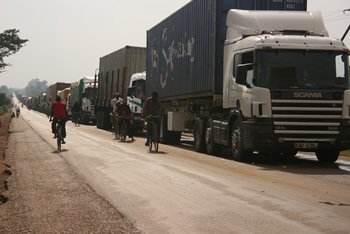Transport experts from landlocked developing countries will meet in Geneva from 22 to 24 October to discuss which policies and methods can provide their nations with the best access to seaports.
The meeting will take place as part of the preparatory process towards next year's review of 10 years of the Almaty Programme of Action. The Programme was adopted in 2004 to address the special needs of landlocked developing countries. It aims at "a new global framework for transit transport cooperation for landlocked and transit developing countries".
The October session, held as an UNCTAD Multi-year Expert Meeting on Transport, Trade Logistics and Trade Facilitation, will consider the roles that can be played by well-designed policies, innovation, and technology in easing the transport difficulties of landlocked nations.
 Being landlocked tends to increase a developing country's shipping costs by as much as 50 per cent.
Being landlocked tends to increase a developing country's shipping costs by as much as 50 per cent.
High transport costs brought about by low trade volumes and inefficient trade and transport practices restrict the access of these countries to global markets.
Many landlocked countries see their capacity to fully engage in international maritime trade as being heavily dependent on the goodwill of coastal transit neighbours.
While such geographical dependence is obvious, efficient transit operation is a shared responsibility.
Final or initial clearance and dispatch procedures in landlocked countries and transit countries can lead to long and costly delays that significantly raise transport costs. High transport costs lead to lower trade volumes, which further spiral into increased transport costs and lower demand. The main sources of delay are at both extremes of the land transit chain - at the transit ports located in coastal countries and at the inland origin/destination points within landlocked countries.
Despite significant progress in understanding the rationale behind the operation of transit transport systems, there is still a need for well-considered policies that will open transport markets, develop logistics services, and enable landlocked economies to link more efficiently into regional and global value chains. The components of such policies are now well known; UNCTAD officials advise that public and business sectors should agree on enforcing them, and say that efforts should be made to find the financial and technical means to do so.
Policy actions should address the skills of local operators along transit corridors and should enable innovative solutions for planning and designing logistics services and infrastructure based on regulatory schemes that allow for dependable and safe trade to and from landlocked countries.
Participants at the meeting may wish to explore how more efficient, predictable, and cost-effective transit logistics can enable producers in landlocked countries to enter global value chains. They may also discuss how regional integration organizations and development partners can help to ensure that new institutional schemes foster, rather than prevent, technological innovation.
The meeting will provide inputs to the preparatory process for a framework for a new development agenda for landlocked developing countries to be considered for adoption in 2014.



